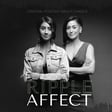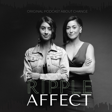
Sofa Series Redux | The Science of Change at a New Pace
This week’s episode of The Ripple Affect Podcast features the re-edit and re-release of Episode 2, a Sofa Series conversation and interview with Neurobiologist Dr. Barbara Thayer, Ph.D. Co-host Isa “Nibby” sits down with one of her beloved professors from California State University, Channel Islands, for a detailed discussion on all things related to change, but this time you’ll hear it with some different editorial choices and at normal speed.
That’s right. The original Episode 2 was sped up to about 1.2x the normal speed! Let us explain...
Early in her editing journey, co-host Chiara “Cheech” wanted to pack as much value as she could from this raw ninety-minute interview into the target one-hour episode timeframe. Consequently, she simply increased the playback speed to fit within that ideal window, but this was not ideal for the average listener—an obvious insight in hindsight. This re-release brings the conversation back to normal speed and includes some new choice selections.
Just like in the original, this episode explores a diverse range of topics, including childhood brain development, deciphering the complexities of long-term potentiation (don’t worry, they discuss what this means in layman's terms), the neuroscience behind habit formation, and distinguishing between the mind, the brain, and consciousness. It delves into the realms of self-regulation, self-esteem, positive psychology, and much more.
Once again, if you listened to the early version in Episode 2, you’ll be taken on a journey that promises to unravel the fascinating world of neurobiology and its profound relationship with personal transformation. By the episode's conclusion, you'll have a deeper comprehension of how your brain helps or hinders the change you’re going through.
CONNECT WITH US!
Visit www.rippleaffectpod.com






